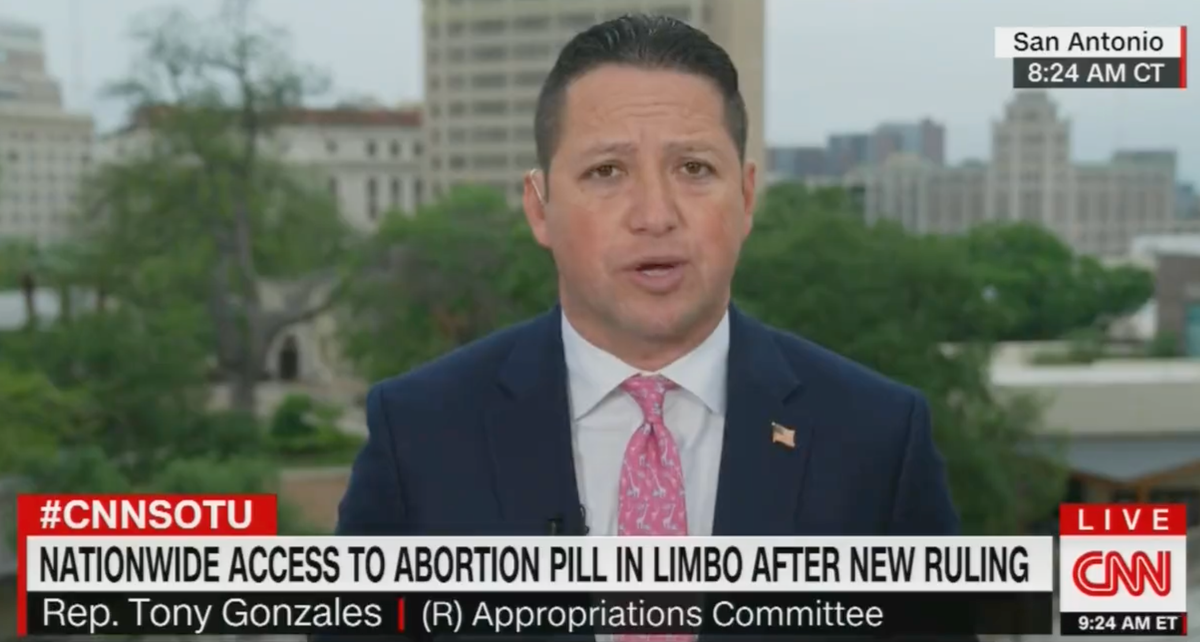
A Republican congressman from Texas dodged questions about a federal court decision to revoke a more than 20-year-old approval for a commonly used abortion drug, instead suggesting that “women have a whole lot of other issues than just abortion” and the US should “talk about the other things that are happening in this world.”
These remarks from US Rep Tony Gonzalez on CNN’s State of the Union on 9 April followed a ruling from a federal judge in his home state to revoke the US Food and Drug Administration’s approval of mifepristone, a widely used drug for medication abortions and miscarriage treatment.
Mr Gonzalez said he supports “states’ rights,” but he stumbled when asked how that accounts for a federal court ruling that will have a dramatic impact to abortion access across the country if it goes into effect.
“Isn’t a federal judge saying on a national level that a pill cannot be administered the opposite of states’ rights?” CNN’s Dana Bash asked him.
He replied that “states started this” but “now the federal government is coming in and dictating theirs”. In the federal court case, the opposite is true: a decision from US District Judge Matthew Kacsmaryk could have profound implications for abortion access across the US, not just in Texas, if federal approval for a commonly used abortion drug is revoked.
The lawsuit was specifically filed by anti-abortion activists last fall in a court where it was likely to be considered by the Donald Trump-appointed judge with a history of anti-abortion activism. Plaintiffs intended for a ruling with sweeping national implications after the US Supreme Court revoked a constitutional right to abortion care by overturning Roe v Wade last summer.
Mr Gonzalez, a member of the House Appropriations Committee, suggested that members of Congress could “defund FDA programs that don’t make sense” if President Joe Biden’s administration challenges the ruling.
Mifepristone is one of a two-drug protocol for medication abortion, a procedure that accounts for more than half of all abortions nationwide.
The drug, which is overwhelmingly considered safe and effective, was approved for use by the FDA in most cases up to 10 weeks of pregnancy in 2000. A vast majority of abortions occur within the first nine weeks. From 2019 through 2020, nearly 93 per cent of all abortions were performed before the 13th week.
Mifepristone is also used to treat miscarriages. Roughly 10 per cent of clinically recognized pregnancies end in miscarriages, according to the American College of Obstetricians and Gynecologists.
“So, are they just on their own if this ruling is upheld?” Ms Bash asked.
“No, I think it’s important that we take care of women,” Mr Gonzalez replied. “It’s important that we have real discussions on women’s healthcare and get off the abortion … conversation. Women have a whole lot more other issues than just abortion.”
“Let’s have those real conversations,” he added. “And let’s talk about the other things that are happening in this world.”
US District Judge Matthew Kacsmaryk determined that the FDA’s initial authorization approval of mifepristone more than 20 years ago was improper and has suspended its approval, which will take effect in seven days from the date of his ruling unless a higher court intervenes.
The US Department of Justice is appealing the decision.
In a separate ruling moments after that decision was handed down on 7 April, a federal judge in Washington state ruled that the FDA cannot change the status quo when it comes to mifepristone’s approval, setting up duelling decisions on a critical abortion drug and the future of abortion access after the US Supreme Court’s decision to revoke a constitutional right to abortion care in Dobbs v Jackson Women’s Health Organization last year.







